By Telos Press · Tuesday, September 1, 2015 Telos Press Publishing is pleased to announce that Ernst Jünger’s Eumeswil is now available for purchase. Order your copy today in our online store.
Eumeswil
by Ernst Jünger
Translated by Joachim Neugroschel
Edited and with an Introduction by Russell A. Berman
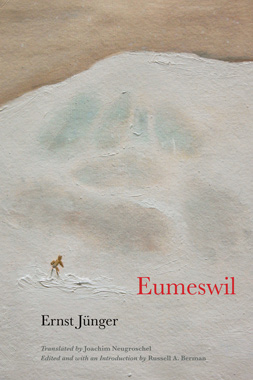 Eumeswil, ostensibly a post-apocalyptic science fiction novel, is effectively a comprehensive synthesis of Ernst Jünger’s mature thought, with a particular focus on new and achievable forms of individual freedom in a technologically monitored and managed postmodern world. Here Jünger first fully develops his figure of the anarch, the inwardly liberated and outwardly pragmatic individual, who lives peacefully in the heart of Leviathan and is yet able to preserve his individuality and freedom. Composed of a series of short passages and fragments, Eumeswil follows the reflections of Martin Venator, a historian living in a futuristic city-state ruled by a dictator known as the Condor. Through Venator, the prototypical anarch, Jünger offers a broad and uniquely insightful analysis of history from the post-historic perspective and, at the same time, presents a vision of future technological developments, including astonishingly prescient descriptions of today’s internet (the luminar), smartphone (the phonophore), and genetic engineering. At once a study of accommodation to tyranny and a libertarian vision of individual freedom, Eumeswil continues to speak to the contradictions and possibilities inherent in our twenty-first-century condition. Eumeswil, ostensibly a post-apocalyptic science fiction novel, is effectively a comprehensive synthesis of Ernst Jünger’s mature thought, with a particular focus on new and achievable forms of individual freedom in a technologically monitored and managed postmodern world. Here Jünger first fully develops his figure of the anarch, the inwardly liberated and outwardly pragmatic individual, who lives peacefully in the heart of Leviathan and is yet able to preserve his individuality and freedom. Composed of a series of short passages and fragments, Eumeswil follows the reflections of Martin Venator, a historian living in a futuristic city-state ruled by a dictator known as the Condor. Through Venator, the prototypical anarch, Jünger offers a broad and uniquely insightful analysis of history from the post-historic perspective and, at the same time, presents a vision of future technological developments, including astonishingly prescient descriptions of today’s internet (the luminar), smartphone (the phonophore), and genetic engineering. At once a study of accommodation to tyranny and a libertarian vision of individual freedom, Eumeswil continues to speak to the contradictions and possibilities inherent in our twenty-first-century condition.
Continue reading →
By David Pan · Thursday, April 9, 2015 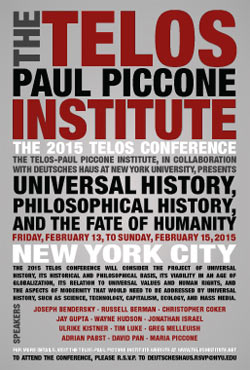 The worldwide reaction to the Charlie Hebdo attacks can be seen as a welcome indication of a global consensus concerning freedom of speech, individual rights, and opposition to Islamic fundamentalism. However, left-wing critics such as Noam Chomsky have criticized the worldwide demonstrations against the attacks as hypocritical because they ignore the more serious massacres that have been conducted by Americans with drone strikes and in military activities in Iraq, Serbia, and Syria. As Chomsky writes, “[a]lso ignored in the ‘war against terrorism’ is the most extreme terrorist campaign of modern times—Barack Obama’s global assassination campaign targeting people suspected of perhaps intending to harm us some day, and any unfortunates who happen to be nearby. Other unfortunates are also not lacking, such as the 50 civilians reportedly killed in a U.S.-led bombing raid in Syria in December, which was barely reported.” Such an equation of “their terror” with “our terror” is based on an image of a universal history in which all of mankind lives within a unified natural community and there is a single standard of measure that could be the basis of criminal behavior. We see this same approach in a more moderate form in Jack Miles’s similar exhortation that the proper response to ISIS and Al Qaeda is that “[y]ou are criminals and we send criminals to jail” rather than declaring a “war on radical Islam.” For both Chomsky and Miles, terrorist attacks count as criminal activity and should be equally condemned from the universal viewpoint of a peace-loving humanity. By diminishing the difference between criminal violence and war, they illustrate the basic tenet of a version of universal history—that all humans are linked together into a common set of natural laws and that such laws transcend historical and political differences. Every war in this perspective would be just as senseless and unjustified as any other form of murder. Teju Cole and Slavoj Žižek make a similar move when they indicate that there is something hypocritical about the support for Charlie Hebdo when other massacres, such as the one by Boko Haram in Baga, Nigeria, go unnoticed and unmourned. The worldwide reaction to the Charlie Hebdo attacks can be seen as a welcome indication of a global consensus concerning freedom of speech, individual rights, and opposition to Islamic fundamentalism. However, left-wing critics such as Noam Chomsky have criticized the worldwide demonstrations against the attacks as hypocritical because they ignore the more serious massacres that have been conducted by Americans with drone strikes and in military activities in Iraq, Serbia, and Syria. As Chomsky writes, “[a]lso ignored in the ‘war against terrorism’ is the most extreme terrorist campaign of modern times—Barack Obama’s global assassination campaign targeting people suspected of perhaps intending to harm us some day, and any unfortunates who happen to be nearby. Other unfortunates are also not lacking, such as the 50 civilians reportedly killed in a U.S.-led bombing raid in Syria in December, which was barely reported.” Such an equation of “their terror” with “our terror” is based on an image of a universal history in which all of mankind lives within a unified natural community and there is a single standard of measure that could be the basis of criminal behavior. We see this same approach in a more moderate form in Jack Miles’s similar exhortation that the proper response to ISIS and Al Qaeda is that “[y]ou are criminals and we send criminals to jail” rather than declaring a “war on radical Islam.” For both Chomsky and Miles, terrorist attacks count as criminal activity and should be equally condemned from the universal viewpoint of a peace-loving humanity. By diminishing the difference between criminal violence and war, they illustrate the basic tenet of a version of universal history—that all humans are linked together into a common set of natural laws and that such laws transcend historical and political differences. Every war in this perspective would be just as senseless and unjustified as any other form of murder. Teju Cole and Slavoj Žižek make a similar move when they indicate that there is something hypocritical about the support for Charlie Hebdo when other massacres, such as the one by Boko Haram in Baga, Nigeria, go unnoticed and unmourned.
Continue reading →
By Lewis West · Friday, February 27, 2015 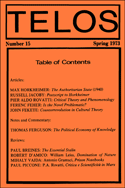 In November 1939, gangs of German civilians and Nazi operatives stormed Jewish stores, synagogues, and homes, killing or arresting those who could not escape. The Nazi leadership had carefully planned the assault—Kristallnacht would become only one among many instances of unimaginable horror. In the coming years, the Nazis proceeded to murder thousands of disabled Germans; when Germany invaded Russia, groups of special units—known as Einsatzgruppen—followed closely behind the German army, liquidating Jews, Communists, and Roma.[1] By 1942, the Nazi death camps had initiated yet another gruesome and terrifying phase of the Reich’s program of anti-Semitism and racial purity.[2] In November 1939, gangs of German civilians and Nazi operatives stormed Jewish stores, synagogues, and homes, killing or arresting those who could not escape. The Nazi leadership had carefully planned the assault—Kristallnacht would become only one among many instances of unimaginable horror. In the coming years, the Nazis proceeded to murder thousands of disabled Germans; when Germany invaded Russia, groups of special units—known as Einsatzgruppen—followed closely behind the German army, liquidating Jews, Communists, and Roma.[1] By 1942, the Nazi death camps had initiated yet another gruesome and terrifying phase of the Reich’s program of anti-Semitism and racial purity.[2]
Continue reading →
By Beau Mullen · Tuesday, December 10, 2013 As an occasional feature on TELOSscope, we highlight a past Telos article whose critical insights continue to illuminate our thinking and challenge our assumptions. Today, Beau Mullen looks at Norman Naimark’s “Totalitarian States and the History of Genocide” from Telos 136 (Fall 2006).
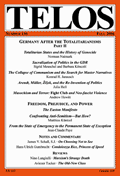 The twentieth century was witness to no shortage of political violence and mass death perpetrated by the state. The two most well-known genocides of the century—those that occurred under the rule of Nazi Germany and the Stalinist Soviet Union—did not occur because the state broke down and lawlessness prevailed. Quite the contrary: both regimes had complete control over their citizenry, and the apparatus of government was used to make the butchery as efficient and as inescapable as possible. Both regimes were characterized by extreme violence and terror, key elements of the totalitarian system as defined by Hannah Arendt, so it seems only logical that totalitarianism increases the potential for genocide. The twentieth century was witness to no shortage of political violence and mass death perpetrated by the state. The two most well-known genocides of the century—those that occurred under the rule of Nazi Germany and the Stalinist Soviet Union—did not occur because the state broke down and lawlessness prevailed. Quite the contrary: both regimes had complete control over their citizenry, and the apparatus of government was used to make the butchery as efficient and as inescapable as possible. Both regimes were characterized by extreme violence and terror, key elements of the totalitarian system as defined by Hannah Arendt, so it seems only logical that totalitarianism increases the potential for genocide.
Continue reading →
By Telos Press · Monday, December 2, 2013  Telos Press is pleased to announce the publication of Ernst Jünger’s The Forest Passage, now available for purchase in our online store. Expertly translated by Thomas Friese, who previously translated Jünger’s The Adventurous Heart, and with an introduction by Russell A. Berman, this key text from Jünger’s oeuvre is finally accessible to English-language readers. Telos Press is pleased to announce the publication of Ernst Jünger’s The Forest Passage, now available for purchase in our online store. Expertly translated by Thomas Friese, who previously translated Jünger’s The Adventurous Heart, and with an introduction by Russell A. Berman, this key text from Jünger’s oeuvre is finally accessible to English-language readers.
Continue reading →
By Johannes Grow · Tuesday, November 19, 2013 As an occasional feature on TELOSscope, we highlight a past Telos article whose critical insights continue to illuminate our thinking and challenge our assumptions. Today, Johannes Grow looks at Russell A. Berman’s “Saddam and Hitler: Rethinking Totalitarianism” from Telos 125 (Fall 2002).
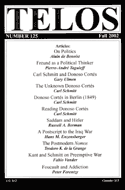 In “Saddam and Hitler: Rethinking Totalitarianism,” Russell A. Berman examines the limits of current efforts to understand totalitarianism in light of the juxtaposition of Nazi Germany and Baathist Iraq. He questions the “cultural approaches” often implemented when approaching the study of the Nazi years. Berman doubts whether the German people, under the increasingly violent and fanatical Nazi regime, were truly a Volksgemeinschaft, a happy population believing in every word of the leader, be it true or false, or as the Baathist regime in Iraq demonstrated, a regime of violence, with the party and the leader as the center node propagating terror throughout the state. The author examines three problems present in contemporary discussions of the Nazi regime that may be further elucidated through a juxtaposition of Hitler’s “movement” with the old Saddam regime. The first involves the futility of defining these regimes as either “Left” or “Right.” These types of distinctions do not allow for a full exploration of the effects of these regimes. The second problem is the aligning of Nazism with a sort of “cultural hegemony” rather than with an environment of coercion, violence, and politics. The third concern involves limiting the question of totalitarianism to a certain period history rather than examining its effects on the present. In “Saddam and Hitler: Rethinking Totalitarianism,” Russell A. Berman examines the limits of current efforts to understand totalitarianism in light of the juxtaposition of Nazi Germany and Baathist Iraq. He questions the “cultural approaches” often implemented when approaching the study of the Nazi years. Berman doubts whether the German people, under the increasingly violent and fanatical Nazi regime, were truly a Volksgemeinschaft, a happy population believing in every word of the leader, be it true or false, or as the Baathist regime in Iraq demonstrated, a regime of violence, with the party and the leader as the center node propagating terror throughout the state. The author examines three problems present in contemporary discussions of the Nazi regime that may be further elucidated through a juxtaposition of Hitler’s “movement” with the old Saddam regime. The first involves the futility of defining these regimes as either “Left” or “Right.” These types of distinctions do not allow for a full exploration of the effects of these regimes. The second problem is the aligning of Nazism with a sort of “cultural hegemony” rather than with an environment of coercion, violence, and politics. The third concern involves limiting the question of totalitarianism to a certain period history rather than examining its effects on the present.
Continue reading →
|
|
 Eumeswil, ostensibly a post-apocalyptic science fiction novel, is effectively a comprehensive synthesis of Ernst Jünger’s mature thought, with a particular focus on new and achievable forms of individual freedom in a technologically monitored and managed postmodern world. Here Jünger first fully develops his figure of the anarch, the inwardly liberated and outwardly pragmatic individual, who lives peacefully in the heart of Leviathan and is yet able to preserve his individuality and freedom. Composed of a series of short passages and fragments, Eumeswil follows the reflections of Martin Venator, a historian living in a futuristic city-state ruled by a dictator known as the Condor. Through Venator, the prototypical anarch, Jünger offers a broad and uniquely insightful analysis of history from the post-historic perspective and, at the same time, presents a vision of future technological developments, including astonishingly prescient descriptions of today’s internet (the luminar), smartphone (the phonophore), and genetic engineering. At once a study of accommodation to tyranny and a libertarian vision of individual freedom, Eumeswil continues to speak to the contradictions and possibilities inherent in our twenty-first-century condition.
Eumeswil, ostensibly a post-apocalyptic science fiction novel, is effectively a comprehensive synthesis of Ernst Jünger’s mature thought, with a particular focus on new and achievable forms of individual freedom in a technologically monitored and managed postmodern world. Here Jünger first fully develops his figure of the anarch, the inwardly liberated and outwardly pragmatic individual, who lives peacefully in the heart of Leviathan and is yet able to preserve his individuality and freedom. Composed of a series of short passages and fragments, Eumeswil follows the reflections of Martin Venator, a historian living in a futuristic city-state ruled by a dictator known as the Condor. Through Venator, the prototypical anarch, Jünger offers a broad and uniquely insightful analysis of history from the post-historic perspective and, at the same time, presents a vision of future technological developments, including astonishingly prescient descriptions of today’s internet (the luminar), smartphone (the phonophore), and genetic engineering. At once a study of accommodation to tyranny and a libertarian vision of individual freedom, Eumeswil continues to speak to the contradictions and possibilities inherent in our twenty-first-century condition.  The worldwide reaction to the Charlie Hebdo attacks can be seen as a welcome indication of a global consensus concerning freedom of speech, individual rights, and opposition to Islamic fundamentalism. However, left-wing critics such as Noam Chomsky have criticized the worldwide demonstrations against the attacks as hypocritical because they ignore the more serious massacres that have been conducted by Americans with drone strikes and in military activities in Iraq, Serbia, and Syria.
The worldwide reaction to the Charlie Hebdo attacks can be seen as a welcome indication of a global consensus concerning freedom of speech, individual rights, and opposition to Islamic fundamentalism. However, left-wing critics such as Noam Chomsky have criticized the worldwide demonstrations against the attacks as hypocritical because they ignore the more serious massacres that have been conducted by Americans with drone strikes and in military activities in Iraq, Serbia, and Syria.  In November 1939, gangs of German civilians and Nazi operatives stormed Jewish stores, synagogues, and homes, killing or arresting those who could not escape. The Nazi leadership had carefully planned the assault—Kristallnacht would become only one among many instances of unimaginable horror. In the coming years, the Nazis proceeded to murder thousands of disabled Germans; when Germany invaded Russia, groups of special units—known as Einsatzgruppen—followed closely behind the German army, liquidating Jews, Communists, and Roma.[1] By 1942, the Nazi death camps had initiated yet another gruesome and terrifying phase of the Reich’s program of anti-Semitism and racial purity.[2]
In November 1939, gangs of German civilians and Nazi operatives stormed Jewish stores, synagogues, and homes, killing or arresting those who could not escape. The Nazi leadership had carefully planned the assault—Kristallnacht would become only one among many instances of unimaginable horror. In the coming years, the Nazis proceeded to murder thousands of disabled Germans; when Germany invaded Russia, groups of special units—known as Einsatzgruppen—followed closely behind the German army, liquidating Jews, Communists, and Roma.[1] By 1942, the Nazi death camps had initiated yet another gruesome and terrifying phase of the Reich’s program of anti-Semitism and racial purity.[2]  The twentieth century was witness to no shortage of political violence and mass death perpetrated by the state. The two most well-known genocides of the century—those that occurred under the rule of Nazi Germany and the Stalinist Soviet Union—did not occur because the state broke down and lawlessness prevailed. Quite the contrary: both regimes had complete control over their citizenry, and the apparatus of government was used to make the butchery as efficient and as inescapable as possible. Both regimes were characterized by extreme violence and terror, key elements of the totalitarian system as defined by Hannah Arendt, so it seems only logical that totalitarianism increases the potential for genocide.
The twentieth century was witness to no shortage of political violence and mass death perpetrated by the state. The two most well-known genocides of the century—those that occurred under the rule of Nazi Germany and the Stalinist Soviet Union—did not occur because the state broke down and lawlessness prevailed. Quite the contrary: both regimes had complete control over their citizenry, and the apparatus of government was used to make the butchery as efficient and as inescapable as possible. Both regimes were characterized by extreme violence and terror, key elements of the totalitarian system as defined by Hannah Arendt, so it seems only logical that totalitarianism increases the potential for genocide.  Telos Press is pleased to announce the publication of Ernst Jünger’s The Forest Passage, now available for purchase in our
Telos Press is pleased to announce the publication of Ernst Jünger’s The Forest Passage, now available for purchase in our  In “Saddam and Hitler: Rethinking Totalitarianism,” Russell A. Berman examines the limits of current efforts to understand totalitarianism in light of the juxtaposition of Nazi Germany and Baathist Iraq. He questions the “cultural approaches” often implemented when approaching the study of the Nazi years. Berman doubts whether the German people, under the increasingly violent and fanatical Nazi regime, were truly a Volksgemeinschaft, a happy population believing in every word of the leader, be it true or false, or as the Baathist regime in Iraq demonstrated, a regime of violence, with the party and the leader as the center node propagating terror throughout the state. The author examines three problems present in contemporary discussions of the Nazi regime that may be further elucidated through a juxtaposition of Hitler’s “movement” with the old Saddam regime. The first involves the futility of defining these regimes as either “Left” or “Right.” These types of distinctions do not allow for a full exploration of the effects of these regimes. The second problem is the aligning of Nazism with a sort of “cultural hegemony” rather than with an environment of coercion, violence, and politics. The third concern involves limiting the question of totalitarianism to a certain period history rather than examining its effects on the present.
In “Saddam and Hitler: Rethinking Totalitarianism,” Russell A. Berman examines the limits of current efforts to understand totalitarianism in light of the juxtaposition of Nazi Germany and Baathist Iraq. He questions the “cultural approaches” often implemented when approaching the study of the Nazi years. Berman doubts whether the German people, under the increasingly violent and fanatical Nazi regime, were truly a Volksgemeinschaft, a happy population believing in every word of the leader, be it true or false, or as the Baathist regime in Iraq demonstrated, a regime of violence, with the party and the leader as the center node propagating terror throughout the state. The author examines three problems present in contemporary discussions of the Nazi regime that may be further elucidated through a juxtaposition of Hitler’s “movement” with the old Saddam regime. The first involves the futility of defining these regimes as either “Left” or “Right.” These types of distinctions do not allow for a full exploration of the effects of these regimes. The second problem is the aligning of Nazism with a sort of “cultural hegemony” rather than with an environment of coercion, violence, and politics. The third concern involves limiting the question of totalitarianism to a certain period history rather than examining its effects on the present. 

